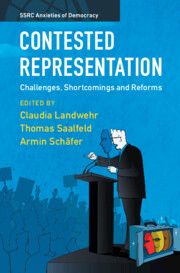Book contents
- Contested Representation
- SSRC Anxieties of Democracy
- Sponsored by the Social Science Research Council
- Contested Representation
- Copyright page
- Contents
- Figures
- Tables
- Contributors
- Acknowledgments
- 1 Introduction
- Part I The Contested Idea of Political Representation
- Part II Representation and Responsiveness in Unequal Societies
- Part III Polarization, New Cleavages, and Shifts in Democratic Government
- 11 Policy and Politics in Disjuncture in an Age of Secular Stagnation
- 12 Polarization and the Making and Breaking of Governments in European Parliamentary Democracies
- 13 Is Populism a Threat or a Chance for Representative Democracy?
- Part IV Constitutional Crisis and Institutional Reform
- Bibliography
- Index
11 - Policy and Politics in Disjuncture in an Age of Secular Stagnation
from Part III - Polarization, New Cleavages, and Shifts in Democratic Government
Published online by Cambridge University Press: 03 November 2022
- Contested Representation
- SSRC Anxieties of Democracy
- Sponsored by the Social Science Research Council
- Contested Representation
- Copyright page
- Contents
- Figures
- Tables
- Contributors
- Acknowledgments
- 1 Introduction
- Part I The Contested Idea of Political Representation
- Part II Representation and Responsiveness in Unequal Societies
- Part III Polarization, New Cleavages, and Shifts in Democratic Government
- 11 Policy and Politics in Disjuncture in an Age of Secular Stagnation
- 12 Polarization and the Making and Breaking of Governments in European Parliamentary Democracies
- 13 Is Populism a Threat or a Chance for Representative Democracy?
- Part IV Constitutional Crisis and Institutional Reform
- Bibliography
- Index
Summary
Across advanced industrial democracies, the financial crisis of 2008 ushered in not just deep economic adjustments but political ones. In many countries, dominant political parties lost voters while new populist parties gained them. Political economists responded to these shifts by asking how the crisis had changed – or failed to change – both what citizens want and politicians’ ability to respond to these wants. But what if the political responses to the crisis reflect not an idiosyncratic shock but instead a much longer term systematic slowdown of advanced economies that has more permanently reshaped the scope for political responsiveness?
Keywords
- Type
- Chapter
- Information
- Contested RepresentationChallenges, Shortcomings and Reforms, pp. 187 - 210Publisher: Cambridge University PressPrint publication year: 2022

